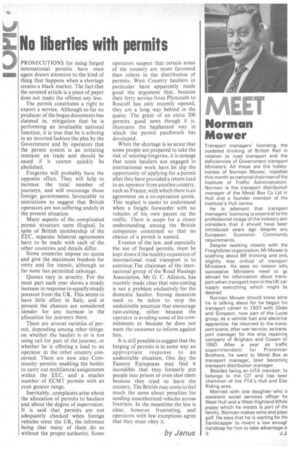No liberties with permits
Page 78

If you've noticed an error in this article please click here to report it so we can fix it.
PROSECUTIONS for using forged international permits have once again drawn attention to the kind of thing that happens when a shortage creates a black market. The fact that the coveted article is a piece of paper does not make the offence any less.
The permit constitutes a right to export a service. Although so far no producer of the bogus documents has claimed in, mitigation that he is performing an invaluable national function, it is true that he is echoing in an inverted fashion the plea by the Government and by operators that the permit system is an irritating restraint on trade and should be eased if it cannot quickly be abolished.
Forgeries will probably have the opposite effect. They will help to increase the total number of journeys, and will encourage those foreign governments , favourable to restrictions to suggest that British operators are not suffering unduly in the present situation.
Many aspects of the complicated permit structure seem illogical. In spite of British membership of the EEC, separate bilateral agreements have to be made with each of the . other countries and details differ.
Some countries impose no quota and give the maximum freedom for entry and for transit, although so far none has permitted eabotage.
Quotas vary in severity. For the most part each year shows a steady increase in response to equally steady pressure from the UK. This seems to have little effect in Italy, and at present the chances are considered slender for any increase in the allocation for journeys there.
There are several varieties of permit, depending among other things: on whether the haulier is or is not using rail for part of the journey, or whether he is offering a load to an operator in the other country concerned. There are now also Community permits enabling the holder to carry out multilateral assignments within the EEC, and a smaller number of ECMT permits with an even greater range.
Inevitably, complaints arise about the allocation of permits to hauliers and about the degree of supervision. It is said that permits are not adequately checked when foreign vehicles enter the UK, the inference being that many of them do so without the proper authority. Some operators suspect that certain areas of the country are more favoured than others in the distribution of permits. West Country hauliers in particular have apparently made good the argument that, because their ferry service from Plymouth to Roscoff has only recently opened, they are a long way behind in the queue. The grant of an extra 200 permits, good news though it is, illustrates the haphazard way in which the permit patchwork has developed.
When the shortage is so acute that some people are prepared to take the risk of uttering forgeries, it is strange that some hauliers not engaged in international work have let slip the opportunity of applying for a permit after they have provided a return load to an operator from another country, such as France, with which there is an agreement on a co-operation quota. This neglect is easier to understand when a freight forwarder with no vehicles of his own passes on the traffic. There is scope for a closer understanding among the British companies concerned so that no chance of a permit is wasted.
Evasion of the law, and especially the use of forged permits, must be kept down if the healthy expansion of international road transport is to continue.The chairman of the international group of the Road Haulage Association, Mr G. C. Alliston, has recently made clear that rate-cutting is not a problem exclusively for the domestic haulier. Strong measures need to be taken to stop the undesirable practices that encourage rate-cutting, either because the operator is avoding some of his commitments or because he does not want the customer to inform against him.
It is still possible to suggest that the forging of permits is in some way an appropriate response to an undesirable situation. One day the Eastern Europeans may find it incredible that they formerly put people into prison or even shot them because they tried to leave the country. The British may come to feel much the same about penalties for sending unauthorized vehicles across frontiers. In the meantime the law is clear, however frustrating, and operators with few exceptions agree that they must obey it.
by Janus












































































































































